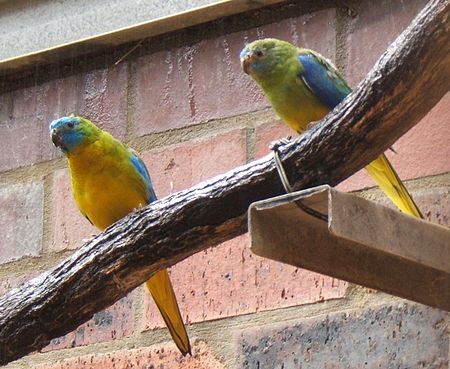Type the name of the breed you're looking for below
[wpdreams_ajaxsearchlite] Don't see the breed your're looking for? Click here and let us know!
Turquoisine Grass Parakeet
| Origin | The Turquoisine Grass Parakeet is a parrot endemic to central South Australia and inland southern Western Australia. |
| Size | This species can grow up to 8 in(20 cm) |
| Lifespan | Can live 10+ years |
| Noise | Moderate, a very good mimic. |
| Characteristics | The male has a cobalt blue face, and bright green upperparts. The lower breast and underparts are yellow, and the wing coverts are pale blue. The tail is green, the eyes are brown and the bill is blackish, and legs are brown-grey. The female likewise has a blue face, although the coloration is less extensive, green upperparts and green breast, with yellow underparts. Immature birds are duller versions of their respective adult forms. Males begin to get red plumage on their chest from around two or three months of age, though do not complete their red chest until fifteen to eighteen months old. |
| Abilities | Like many other parakeets this species can mimic conversation quite well. |
| Interaction/Time Requirements, Diet, Supplies Needed | A minimum of 12 inches long, 14 inches wide, and 15 inches high. Space is important and indoor cages should be as large as possible. A large cage is required even if the bird is going to spend lots of time out of its habitat with you. Aviaries are sold ready for home assembly. Most are a rectangular design, with a mesh covered flight, and smaller shelter area, in which the birds are fed and can take shelter from the bad weather. They require a warm habitat for the winter months. Do not allow your birds outdoors until all signs of frost are gone. They eat a seed mixture that contains various millets and other small seeds such as niger. You need to change food and water twice daily, and clean the cage at least once a day, replacing toys and broken climbing branches. |



